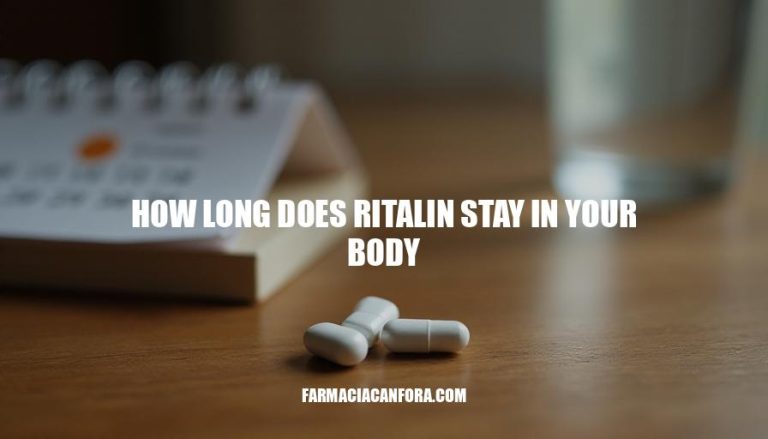


So you’re wondering how long Ritalin stays in your system? It’s a medication used to treat ADHD and narcolepsy. Knowing how it affects your body is important because it helps you manage your treatment, makes sure the medicine works well, and keeps an eye out for any side effects.
It also helps you stick to your dosing schedule and avoid problems with other medications or activities that require clear thinking and physical coordination.
Ritalin, also known as methylphenidate, has a half-life of approximately 2-3 hours. This means it takes about 2-3 hours for half of the drug to be eliminated from the body. However, the duration Ritalin stays in the system can vary based on several factors.
Factors influencing Ritalin’s duration in the body include:
Age: Older individuals tend to eliminate the drug more slowly than younger individuals.
Body mass: Weight can influence the rate at which Ritalin is eliminated, with heavier people typically eliminating it more quickly.
Metabolism: Individual differences in metabolism can significantly affect how fast the drug is eliminated.
Use with alcohol: Consuming alcohol while taking Ritalin can slow down its elimination, as the liver prioritizes metabolizing alcohol over other substances.
Typical time frames for Ritalin in the system:
Urine: Ritalin can be detected in urine for 1-2 days.
Blood: It remains in the blood for around 12 hours.
Saliva: Similar to urine, Ritalin can be detected in saliva for 1-2 days.
Hair: Ritalin can be detected in hair follicles for up to 90 days.
These time frames can vary based on individual factors and the specific formulation of Ritalin used (immediate-release vs.
extended-release).
Ritalin, also known as methylphenidate, has a half-life of approximately 2-3 hours, meaning it takes around 2-3 hours for half of the drug to be eliminated from the body. However, its duration in the system can vary based on several factors such as age, body mass, metabolism, and use with alcohol.
It’s essential to understand how long Ritalin stays in the body to manage treatment effectively, avoid side effects, and ensure safe use. Being informed about its duration helps individuals stick to their dosing schedule, avoid interactions with other medications or activities that require clear thinking and physical coordination, and make informed decisions about their health.